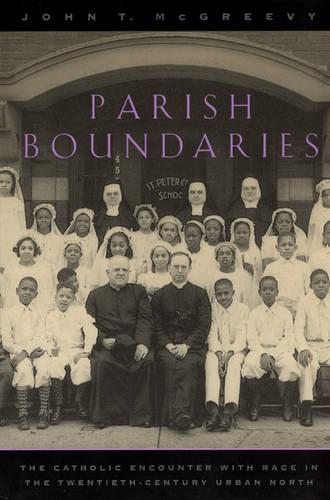Overview
Parish Boundaries chronicles the history of Catholic parishes in major cities such as Boston, Chicago, Detroit, New York, and Philadelphia, melding their unique place in the urban landscape to the course of twentieth century American race relations. In vivid portraits of parish life, John McGreevy examines the contacts and conflicts between Euro-American Catholics and their African-American neighbors. By tracing the transformation of a church, its people, and the nation, McGreevy illuminates the enormous impact of religious culture on modern American society. ""Parish Boundaries can take its place in the front ranks of the literature of urban race relations.""—Jonathan Dorfman, Washington Post Book Review ""A prodigiously researched, gracefully written book distinguished especially by its seamless treatment of social and intellectual history.""—Robert Orsi, American Historical Review ""Parish Boundaries will fascinate historians and anyone interested in the historic connection between parish and race.""—Ed Marciniak, Chicago Tribune ""The history that remains to be written will rest on the firm foundation of Mr. McGreevy's remarkable book.""—Richard Wightman Fox, New York Times Book Review
Full Product Details
Author: John T. McGreevy
Publisher: The University of Chicago Press
Imprint: University of Chicago Press
Edition: New edition
Dimensions:
Width: 1.60cm
, Height: 0.20cm
, Length: 2.30cm
Weight: 0.567kg
ISBN: 9780226558745
ISBN 10: 0226558746
Pages: 368
Publication Date: 08 May 1998
Audience:
College/higher education
,
Professional and scholarly
,
Undergraduate
,
Postgraduate, Research & Scholarly
Format: Paperback
Publisher's Status: Active
Availability: Manufactured on demand

We will order this item for you from a manufactured on demand supplier.
Reviews
An account of how the Catholic Church in urban areas, with its largely ethnic parishes, responded to American racism and the ferment of the civil rights movement. Throughout most of this century, McGreevy (History/Harvard) asserts, Catholic parishes, with their distinctive emphasis on geographical boundaries, constituted a unique combination of educational, religious, and social communities, representing a specifically Catholic style of merging neighborhood and region. Catholics arriving in America gravitated to areas in which there were Catholic churches, and the neighborhoods developed a clear, intense ethnic identity that did not easily admit outsiders. McGreevy concentrates on the period between WW I, when the Catholic system of parishes and schools aggressively expanded into every section of the cities, and the early 1970s, when the system began to show signs of strain. He is especially interested in exploring how Catholics and African-Americans interacted with one another. There was, early on, clear Vatican impatience with the existence of separate Catholic institutions for blacks. A number of individuals in the Church were uneasy with the unintended results of the parish system: Jesuit John LaFarge worked for greater integration, as did the Federation of Coloured Catholics. Public figures like Bishop Sheen and Cardinal Spellman presented a vision of Catholicism as transcending national and racial boundaries. Many Catholics endorsed integration in principle but fiercely opposed upsetting the ethnic homeostasis of their own parishes. In the 1960s Catholics' social consciousness was raised by the Second Vatican Council and the civil rights movement. But as the model of integration came to be questioned in the name of respect for diversity, liberal Catholics who had fought against the parish system were, paradoxically, faced with a crisis. For many, their religious affiliation seemed an obstacle that protected a discredited status quo. A thorough, sensitive, and balanced contribution. (Kirkus Reviews)



